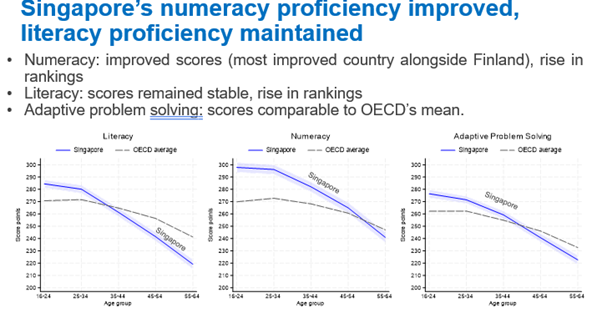
Event
Skills Proficiency In Singapore: OECD Findings
Skills Proficiency In Singapore: OECD Findings
Description
The latest round of findings from the Survey of Adult Skills by the Organisation of Economic Cooperation and Development (OECD) is out. The good news? “Singapore was the most improved country for numeracy alongside Finland, rising in ranking from 25th out of 39 countries in Cycle 1, to 10th out of 31 countries in Cycle 2. While our literacy proficiency scores remained stable, Singapore rose in ranking from 28th out of 39 countries in Cycle 1, to 18th out of 31 in Cycle 2. The not-so-good news? Adults here see a steep decline in literacy skills from the age of 35 onwards, which in turn has significant implications for workforce development and lifelong learning.

The Programme for the International Assessment of Adult Competencies (PIAAC) by OECD assesses the proficiency of adults in literacy, numeracy, and adaptive problem-solving skills across participating developed economies via the Survey of Adult Skills. These proficiencies are fundamental information processing skills that enable adults to acquire new knowledge and competencies.
This cycle of the international study, which was implemented by IAL as the Programme management team for Singapore, was carried out from 2022 to 2023 and saw IAL surveying around 5,000 Singapore citizens and permanent residents aged between 16 and 65. While the results show that Singapore is faring better compared to the first cycle of assessment eight years ago, what is concerning is the atrophy in literacy with age when comparing the same cohort of adults between cycles. The mean score for literacy in Singapore at 255 is also lower than the OECD mean of 260.
Literacy skills in Singapore
To be fair, the earlier onset of decline in literacy skills with age is not unique to Singapore. This trend is also seen in other developed countries such as Hungary, Poland, and South Korea where decline in skills take place even among the cohort of adults aged 27-34 in 2023.
The trend could be caused by a few possible factors. Firstly, it could be that the participants stopped actively growing or maintaining their literacy proficiencies after leaving school as requirements at work and in daily life may not be as demanding. Secondly, the assessment of literacy is based on English language proficiency. While English is the official working language in Singapore, it remains a multi-lingual society and English may not be the primary language in certain work or home settings.
Separately, it was also noted that foreign-born adults of foreign-born parents, constituting some 23% of the participants in Singapore, display lower proficiency in literacy as compared to native-born adults of native-born parents. Literacy proficiency is also observed to have declined among foreign-born adults between the first and second rounds of assessment.
Is literacy still relevant in the age of AI?
Literacy forms the basis of core skills and our cognitive ability to acquire more skills and competencies. Experts agree that with AI proliferation, core skills such as communication, information processing, problem-solving, and decision making will become more important than ever and will form one of the key differentiating factors in work performance.
In the workplace, one critical domain that remains irreplaceable by AI are people skills—the ability to detect nuance, make meaning, exercise judgement, empathise, and read non-verbal skills. These skills are inextricably connected to literacy and are essential for effective teamwork and navigating interactions with stakeholders, both internal and external.
Lastly, most generative AI tools used in the workplace now are based on large language models and require effective language skills on the part of users to engineer meaningful and relevant prompts. To work with AI, literacy is a must.
Invest in continual lifelong learning for higher wages and better well-being
Higher proficiency in the three key domains – numeracy, literacy and adaptive problem-solving – is critical to employability. More interestingly, the survey also finds that skills are closely related to individual well-being. Adults who score the highest in proficiency are also more likely to report high levels of career and life satisfaction and being in very good or excellent health than adults with low scores.
In Singapore, the findings by IAL also show that higher skills are key drivers of employability and wages, with adults who scored high for numeracy having better employment opportunities. Its positive connection with well-being and health holds even after accounting for factors such as age, gender, educational background etc.
These findings give us insight into the importance of maintaining proficiency in these core domains, and continual upskilling and reskilling. Addressing the decline in proficiencies will require a multi-pronged approach with the TAE sector playing a central role in delivering effective learning for adults, and individuals taking ownership of the need to maintain such proficiencies.
Mr Tan Kok Yam, CEO of SkillsFuture Singapore and Chairman of IAL council shared, “The PIAAC results give us confidence that our workforce has raised its collective capacity to upskill and adapt. At the same time, there is room to do even better. Companies, institutions and Government need to work together to advance the SkillsFuture movement and achieve three objectives: help our mid-careerists benefit from further education and training; maintain Singaporeans’ capacity to learn after they leave school; ensure that our workforce stay relevant amid technological change.”

The Programme for the International Assessment of Adult Competencies (PIAAC) by OECD assesses the proficiency of adults in literacy, numeracy, and adaptive problem-solving skills across participating developed economies via the Survey of Adult Skills. These proficiencies are fundamental information processing skills that enable adults to acquire new knowledge and competencies.
This cycle of the international study, which was implemented by IAL as the Programme management team for Singapore, was carried out from 2022 to 2023 and saw IAL surveying around 5,000 Singapore citizens and permanent residents aged between 16 and 65. While the results show that Singapore is faring better compared to the first cycle of assessment eight years ago, what is concerning is the atrophy in literacy with age when comparing the same cohort of adults between cycles. The mean score for literacy in Singapore at 255 is also lower than the OECD mean of 260.
Literacy skills in Singapore
To be fair, the earlier onset of decline in literacy skills with age is not unique to Singapore. This trend is also seen in other developed countries such as Hungary, Poland, and South Korea where decline in skills take place even among the cohort of adults aged 27-34 in 2023.
The trend could be caused by a few possible factors. Firstly, it could be that the participants stopped actively growing or maintaining their literacy proficiencies after leaving school as requirements at work and in daily life may not be as demanding. Secondly, the assessment of literacy is based on English language proficiency. While English is the official working language in Singapore, it remains a multi-lingual society and English may not be the primary language in certain work or home settings.
Separately, it was also noted that foreign-born adults of foreign-born parents, constituting some 23% of the participants in Singapore, display lower proficiency in literacy as compared to native-born adults of native-born parents. Literacy proficiency is also observed to have declined among foreign-born adults between the first and second rounds of assessment.
Is literacy still relevant in the age of AI?
Literacy forms the basis of core skills and our cognitive ability to acquire more skills and competencies. Experts agree that with AI proliferation, core skills such as communication, information processing, problem-solving, and decision making will become more important than ever and will form one of the key differentiating factors in work performance.
In the workplace, one critical domain that remains irreplaceable by AI are people skills—the ability to detect nuance, make meaning, exercise judgement, empathise, and read non-verbal skills. These skills are inextricably connected to literacy and are essential for effective teamwork and navigating interactions with stakeholders, both internal and external.
Lastly, most generative AI tools used in the workplace now are based on large language models and require effective language skills on the part of users to engineer meaningful and relevant prompts. To work with AI, literacy is a must.
Invest in continual lifelong learning for higher wages and better well-being
Higher proficiency in the three key domains – numeracy, literacy and adaptive problem-solving – is critical to employability. More interestingly, the survey also finds that skills are closely related to individual well-being. Adults who score the highest in proficiency are also more likely to report high levels of career and life satisfaction and being in very good or excellent health than adults with low scores.
In Singapore, the findings by IAL also show that higher skills are key drivers of employability and wages, with adults who scored high for numeracy having better employment opportunities. Its positive connection with well-being and health holds even after accounting for factors such as age, gender, educational background etc.
These findings give us insight into the importance of maintaining proficiency in these core domains, and continual upskilling and reskilling. Addressing the decline in proficiencies will require a multi-pronged approach with the TAE sector playing a central role in delivering effective learning for adults, and individuals taking ownership of the need to maintain such proficiencies.
Mr Tan Kok Yam, CEO of SkillsFuture Singapore and Chairman of IAL council shared, “The PIAAC results give us confidence that our workforce has raised its collective capacity to upskill and adapt. At the same time, there is room to do even better. Companies, institutions and Government need to work together to advance the SkillsFuture movement and achieve three objectives: help our mid-careerists benefit from further education and training; maintain Singaporeans’ capacity to learn after they leave school; ensure that our workforce stay relevant amid technological change.”
For upskilling courses, please visit our website.
